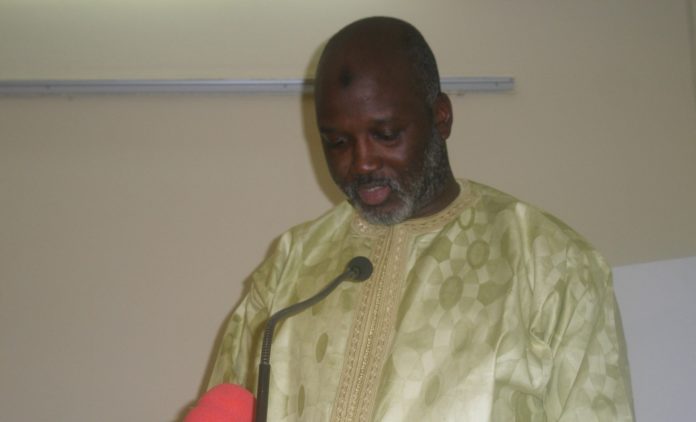By Momodou Jarju
The Attorney General and Minister of Justice of The Gambia, was full of praises to the country’s judicial system while delivering a speech yesterday at a local hotel in Kotu.
The day-long meeting was organized by the National Human Rights Commission (NHRC) and supported by the United Nations.
Established by an Act of parliament in 2017, the NHRC is tasked to monitor, receive, investigate and consider complaints of human rights violations in the Gambia, including violations by private persons and entities among others.
Abubacarr Tambadou recounted numerous improvements President Barrow-led administration registered since its installment more than two years ago.
Minister Tambadou said the recent voluntary return of two former officials of the Gambia Armed Forces in January 2018, who had followed president Jammeh into exile in 2017, is an implicit demonstration of faith in the new administration of justice system in The Gambia.
The two soldiers were Brigadier General Ansumana Tamba and Brigadier Umpa Mendy, who are now being tried in a court-martial.
“Their voluntary return to the country indicates a degree of confidence that they would receive fair treatment and fair trial and further suggest a lack of fear of being tortured or mistreated upon arrest. They have, as you all know, since been taken into custody and are now being tried in a court martial that is open to the general public,” he said.
Prohibition of Torture
Tambadou said the government has ratified the UN Convention Against Torture in September 2018 and a decision has been made to criminalize acts of torture through the ongoing review process of the Criminal Justice Legislative Framework and through the enactment of an international crime act.
He added that the government is committed to signing and ratifying the Optional Protocol to the Convention Against Torture.
“Linked to the prohibition of torture is the prohibition of inhumane and degrading treatment. Police arrests are now conducted in more humane ways and that our prisons, while still not up to standard, are far better places of detention than they were under the previous administration,” he said.
He said a series of sensitization was rolled out for law enforcement agencies in the country with support from partners. He further said the death penalty continues to divide public opinion in the country as manifested during the public consultations with the constitutional review commission. But according to him, the Government has made public its preference for total abolition.
The Minister said The Gambia is presently one of only nine countries in the commonwealth that has acceded to all core international human rights treaties and they have now started submitting periodic reports to human rights treaty bodies.
“This includes our report to the International Covenant on Civil and Political Rights Committee in Geneva in 2017 which covers the period between 1989 and 2017 and more recently the report to the African Commission submitted last month, which covers the period between 1994 and 2018,” he said.
Justice Minister Tambadou said submitting periodic reports is an important accountability mechanism to monitor and evaluate progress by states in the promotion and protection of civil, political, economic, social and cultural rights.
However, he said the Government continues to grapple with the legacies of the previous administration despite the above-mentioned progresses.
“More recently there were clashes between the police and some villagers in the sand mining region called Faraba Banta, you are all aware of that incident, three civilians were shot dead by the police and several others including some police personnel also sustained injuries during the clashes,” he said.
He said the government swiftly established a commission of inquiry to investigate the matter and from the findings and recommendations of the commission, the Government is taking measures, including initiation of criminal prosecution against the police personnel suspected to have shot-dead the three civilians and the establishment of a task force to oversee the compensation of the families of those who died or sustain injuries.
The chairperson of the National Human Rights Commission, Emmanuel Joof, said the meeting provides an opportunity for the Commission to raise the awareness of its mandate among stakeholders and explore possible partnership.
He added that a lot of people have different ideas of what the NHRC is; whether it’s a government institution, Non-Governmental Organization, civil society organisation or a regional organisation.
He said, as a permanent body which would never phase off as other commissions, the meeting also aims to strengthen the knowledge and skills of key stakeholders.
“We need a common understanding of human rights frameworks. We must be talking the same language. We must understand what we are talking about when we say human rights, what are the frameworks. And also how the NHRC plays a part in this whole process,” he said.

















